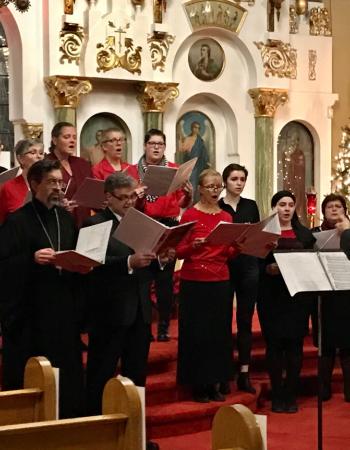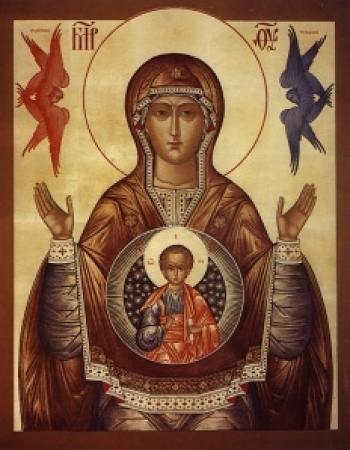To celebrate the upcoming season, we wanted to offer you a few traditions from around our jurisdictions in the US. The chief thing we have in common? Fasting! But we enjoy the season much more than that would make it seem...
Malankara Orthodox Syrian Church (Lijin Hannah Thomas)
We don't have really an advent tradition either other than the typical fasting until Christmas. Our parishes do caroling at every parishioners home over the weekends leading up to Christmas. They sing 1-2 songs, do a short prayer and then certain homes have Lenten snacks and food. The last house of the day provide dinner for the carolers. Our parishes also usually have Christmas shows put on by the Sunday school children. On Christmas Eve is when mom cooks preparing the non-Lenten food to be eaten after Christmas liturgy. Ukrainian (Gayle Woloschak)
Perhaps one of the most important traditions in our church is that the Ukrainian Orthodox League developed a “praying through the fast” series several years ago for every Lenten time of the year....they have people sign up and each day we have assigned readings and assigned people to pray for. I do this for every fast and it really makes for a Lenten experience that puts me closer to God and to others.
Orthodox Church in America (Sarah Riccardi-Swartz)
Advent is always extra special in our home because my husband's nameday falls on December 4th. His patron is St. John of Damascus. I always bake a lenten cake for the feast. We usually chant an akathist to St. John and venerate some of his relics that we were gifted by my godfather. This year we also began a new tradition (for us) of an advent wreath with candles. Pro tip: Use LED candles if you have small children!

Orthodox Church in America (Patricia Fann Bouteneff)
We have a fast that begins on November 15. Although our caroling tradition takes place after Christmas, our parish does typically hold a Christmas concert for the surrounding community.
Since our parish began as a Slavic community 120 years ago, many of our parishioners celebrate Holy Supper, a meal that is served on Christmas Eve. It is a Lenten meal that usually includes twelve different foods (one for each apostle), which generally include barley, honey, stewed prunes, pierogi, sauerkraut, potatoes, lima beans, garlic, bread, mushroom soup, and salt. They range from bitter to sweet to symbolize the bitterness of life before Christ’s birth and its sweetness afterward.
Our own family lives in a largely Catholic neighborhood where most people line the curbs outside their houses with candles in paper bags to guide the Baby Jesus home. We tour the neighborhood after vespers to enjoy the sight of the lights winding up and down the hills.
Greek Orthodox Archdiocese (Spyridoula Fotinis)
We don’t have traditions per say but as a family we always attend vespers for many of the saints celebrated in December into January. We also celebrate each other’s namedays within our family by attending services for each. We start with my nameday (St. Spyridon December 12th), followed by my brother’s on Christmas, and then my mother’s on New Years Day for St. Basil. For Christmas we love attending the midnight service and my mom always makes a birthday cake for Jesus. So we sing happy birthday and the hymns of the feast. On New Years Day we have a huge open house celebration where we celebrate the feast, the New Year, and all our namedays, especially with Greek New Years Day Carols and the Basilopita cake.
Malankara Syrian Orthodox Church in North America (Asha Mathai)
We observe no other traditions than the typical fast but...
Our parishes engage in a tradition of singing Christmas Carols' songs at the parish members' homes and their friends during the weekends. These occur on Saturdays and after Liturgy on Sundays. The songs are sung in Malayalam and English, announcing the birth of Jesus. (Think of Christmas Carolers who enter your home!) The parish visits a member's house to sing, and the family provides a snack afterward for those attending. All members of the congregation from young to old participate.


Russian Orthodox Church Outside Russia (Judith Scott)
Every year on the first Friday of December , close to the feast day of St Nicholas, my parish, St Gregory the Theologian hosts a conference that serves as a gathering force for contemporary Orthodox scholars, theologians, spiritual teachers, ethicists activists and lay people. It was named in honor of Sophia, Divine Wisdom. Now called the Institute for the Study of Eastern Christianity, the conference aims to encourage the study of the Orthodox Christian Tradition – its history, thought, liturgical and spiritual cultures – as well as issues of its ecumenical and social – ethical engagement with the contemporary world. The doors of the seminary are open for the presentation of papers, keynote speakers, informal gatherings and musical performances with icons and books on exhibit. Participants come from many nations and branches of Orthodoxy and it is a deeply intellectual, socially engaging and festive event. A publication of papers documents the work and adds to the literature and scholarship of Orthodoxy today. Past themes are Women in Orthodoxy; Creation, Redemption and Environmental Ethics; the Theology of Beauty, and this year’s Engaging Orthodox Christian Theology with Today’s World for whom our very own Dr Patricia Boutneff serves as a keynote speaker. What a wonderful Advent practice joining as it does scholarship, faith, ethics, fellowship (and sistership) and the energy and spirit of today’s Orthodox world. Please put this on your calendar this year and in the years to come. https://www.isecny.org/
Armenian (h/t Arpi Nakashian)
Instead of Advent, the Armenian church calendar ends the year with “Heesnag,” a fifty-day period that begins on the Monday closes to November 18 and ends on the eve of Theophany (January 5). Heesnag includes three five-day fasts, the Fast of Heesnag, the Fast of St. James of Nisibis, and the Theophany Fast.
Many thanks to everyone who participated. We hope to learn even more for next year!


